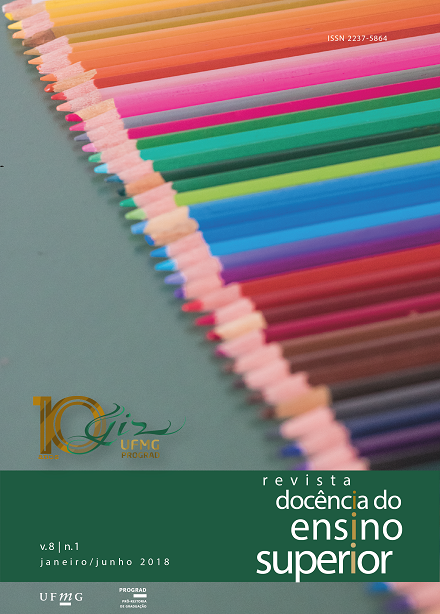O ensino de Libras no curso de Pedagogia
desafios, avanços e o papel do intérprete educacional
DOI:
https://doi.org/10.35699/2237-5864.2018.2431Palavras-chave:
Libras, Intérprete, Professor, Desafios, PedagogiaResumo
Nas últimas décadas, observamos várias conquistas com a implantação do ensino de Libras nos cursos de licenciatura em 2005 e de uma legislação que possibilita o acesso e a permanência de professores e alunos surdos nos cursos superiores. O objetivo desta pesquisa é investigar a opinião dos alunos de uma turma de Pedagogia em relação aos principais desafios e avanços que a educação de surdos obteve com a inserção da disciplina Libras no currículo do curso de Pedagogia e compreender os obstáculos enfrentados pelo intérprete e pelo professor na consolidação dos seus papéis no processo de aprendizagem. Trata-se de uma pesquisa exploratória qualitativa que, através do olhar dos discentes, desvenda a fragilidade da legislação referente aos direitos dos surdos; o preconceito/resistência que os profissionais da educação possuem ao lidar com os alunos surdos e a falta de clareza dos futuros pedagogos em relação às funções exercidas pelos profissionais da área.
Downloads
Downloads
Publicado
Edição
Seção
Licença
Autores que publicam nesta revista mantêm os direitos autorais e concedem à revista o direito de primeira publicação, com o trabalho simultaneamente licenciado sob a Licença Creative Commons Attribution que permite o compartilhamento do trabalho com reconhecimento da autoria e publicação inicial nesta revista.
Autores têm autorização para assumir contratos adicionais separadamente, para distribuição não-exclusiva da versão do trabalho publicada nesta revista (ex.: publicar em repositório institucional ou como capítulo de livro), com reconhecimento de autoria e publicação inicial nesta revista.
Política de acesso aberto:
A Revista Docência do Ensino Superior é um periódico de Acesso Aberto, o que significa que todo o conteúdo está disponível gratuitamente, sem custo para o usuário ou sua instituição. Os usuários podem ler, baixar, copiar, distribuir, imprimir, pesquisar ou vincular os textos completos dos artigos, ou usá-los para qualquer outra finalidade legal, sem solicitar permissão prévia do editor ou do autor, desde que respeitem a licença de uso do Creative Commons utilizada pelo periódico. Esta definição de acesso aberto está de acordo com a Iniciativa de Acesso Aberto de Budapeste (BOAI).



























